
by Steve | Aug 31, 2016 | July-Aug2016, Magazine, Magazine Articles
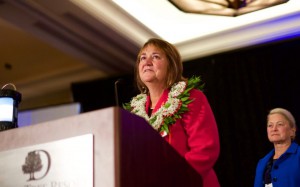
The Rev. Karen Oliveto accepts her election by the Western Jurisdiction as a United Methodist bishop. At the time of her election, Oliveto was the senior pastor at Glide Memorial United Methodist Church in San Francisco, Calif. Her wife, Robin Ridenour, stands behind her. Photo by Patrick Scriven, Pacific-Northwest Conference.
The Rev. Dr. Karen Oliveto, senior minister of Glide Memorial United Methodist Church in San Francisco, has been elected as a bishop by the Western Jurisdiction of The United Methodist Church. She is the first openly married lesbian to be elected bishop within the denomination. After two other candidates withdrew concluding the 16th ballot, Oliveto’s name was the lone candidate choice on the screen before the delegates.
She was one of three openly gay candidates running for bishop within The United Methodist Church. Gathering in Phoenix, the Western Jurisdiction delegates sent a provocative message to the worldwide 12-million member United Methodist Church – a denomination with over 5 million members in Africa and the Philippines.
“I think at this moment I have a glimpse of the realm of God,” Oliveto said from the podium after her election. “I want to thank the candidates who I have journeyed with these past few days, for the grace with which we walked with each other. And I know I stand before you because of the work and prayers of so many, especially those saints who yearned to live for this day, who blazed a trail where there was none, who are no longer with us, and yet whose shoulders I stand on.”
Oliveto was a prominent signer of an open letter written by 111 “local pastors, deacons, elders, and candidates for ministry” with the intent to publicly come out to General Conference delegates on the day before the policy-making event took place in Portland. She has been the chair of the board of Reconciling Ministries Network and recently served as the Associate Dean for Academic Affairs at Pacific School of Religion where she continues as adjunct professor of United Methodist Studies.
“There is a lot of dissatisfaction on all sides of the theology divide about the state of the church,” Oliveto told CBS News in San Francisco in May. “While the ‘issue’ is human sexuality, it goes much deeper theologically into how we interpret Scripture. It is time the UMC finally has an honest conversation about this.”
The Council of Bishops was charged by the 2016 General Conference to create a special commission to explore the possibility of how the denomination can move forward with seemingly irreconciable theological differences over interpretation of Scripture, marriage, and sexuality. Half a dozen annual conferences in the United States preemptively voted to pass variations on a resolution of non-conformity to the provisions of the Book of Discipline on issues of human sexuality.
The election of an openly gay bishop is not the kind of conversation that moderate and conservative lay and clergy leaders had in mind as the bishops prepare to appoint the commission to study the church’s sexual ethics and preserve denominational unity.
“It is deplorable that the Western Jurisdiction, along with many annual conferences, has ignored the Council of Bishop’s proposal, ratified by the General Conference, for a ‘pause for prayer – to step back from attempts at legislative solutions and to intentionally seek God’s will for the future,’” said the Rev. Rob Renfroe, president of Good News, in response to the Western Jurisdiction election.
“Instead, these conferences have moved ahead with legislative enactments pledging non-conformity with the Book of Discipline, culminating in the election of a practicing homosexual as bishop,” said Renfroe. “If the Western Jurisdiction wanted to push the church to the brink of schism, they could not have found a more certain way of doing so.”
Matt Berryman, executive director of the Reconciling Ministries Network, said that Oliveto’s election “breaks through anti-LGBTQ law in The UMC and carries queer people to the highest levels of church leadership. Officially barred from so many churches and positions of spiritual leadership, queer persons may now see themselves as leaders of the body of Christ in the largest mainline Protestant denomination in the United States.”
According to the New York Times, Oliveto has performed more than 50 “holy unions” for same-sex couples. “My bishop has been very supportive of me and my wife,” Oliveto told CBS.
The Northeastern Jurisdiction passed a resolution of non-conformity regarding the church’s prohibitions against same-sex weddings and the ordination of openly gay clergy. The jurisdiction also called on annual conference financial officers to state that there are no funds available to investigate complaints or conduct trials for clergy who violate the church’s teachings.
“In light of the Western and Northeastern Jurisdiction’s actions effectively renouncing their connection to the rest of global United Methodism, evangelicals and traditionalists within the church will be conferring in the next few days to agree upon responses that will acknowledge this grave breach of unity,” said the Rev. Thomas Lambrecht, vice president of Good News. “If our covenant is no longer in force, we will be forced to live into a new reality in our denomination.”
– Good News Media

by Steve | Aug 31, 2016 | July-Aug2016, Magazine, Magazine Articles
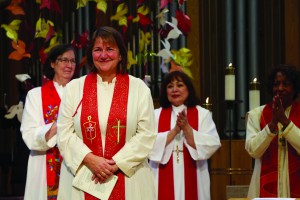
Newly elected Bishop Karen Oliveto, a married Lesbian who has become the first openly gay bishop in United Methodism, stands with Bishop Elaine Stanovsky, left, and Bishop Minerva Carcano. Photo by Charmaine Robledo, Mountain Sky Episcopal Area.
By Kathy Gilbert, UMNS-
The first time she stood and faced a packed church as the newest bishop of the Western Jurisdiction, Karen Phyllis Oliveto was blessed with a resounding standing ovation. On July 16, the pews at Paradise Valley United Methodist Church in Scottsdale, Arizona, were filled with family, friends, and supporters who cheered and danced with her to the recessional hymn, “Somos el Cuerpo de Christo, We Are the Body of Christ.”
As the first out lesbian to be elected a bishop, she is not receiving the same affirmation from across the denomination. Her day started with a press conference where she and Greater Northwest Episcopal Area Bishop Grant Hagiya answered questions about what her election as bishop means, since the denomination forbids ordaining practicing, self-avowed homosexuals. Oliveto has been legally married to Robin Ridenour for more than two years, and they have been in a relationship since they met at a junior-high camp as counselors 17 years ago.
Hagiya said the election of Oliveto was led by the Holy Spirit. “We understand there may be some political implications, but in our mind this was the best person. It was not a question of (sexual) orientation, it was a question of who was the best spiritual leader. The body spoke and said ‘Yes, this is the one.’ ”
He added this election will not derail the General Conference 2016’s decision to support the Council of Bishops’ plan to appoint a special commission that would address all aspects of human sexuality currently covered in church law.
On the heels of her election, members of the South Central Jurisdiction voted 109-84 late on July 15 to ask the Judicial Council for a declaratory decision regarding gay and lesbian church leaders. The Judicial Council is the denomination’s supreme court.
What will happen with any challenge to the election, such as the South Central Jurisdiction’s appeal to the Judicial Council for a declaratory judgment, is unclear. “There are no precise precedents for the drama of this kind of thing where church law specifically says a person in this situation shall not be ordained or appointed and, suddenly, exactly the person described in church law is elected bishop,” said the Rev. William Lawrence, a Perkins School of Theology professor of church history and former president of the denomination’s Judicial Council.
“I think in the short run there will be significant anxiety and negative reaction in many parts of the church,” he said. “And there will be great celebration in other parts of the church. The election reflects an expression of the division we currently have over matters of human sexuality.”
Oliveto’s election might intensify tensions within the council, said Lawrence. “There will be members of the Council of Bishops, active bishops who have voice and vote, who find themselves in a position where their own theology and their own ecclesial leadership in the church would find Bishop Oliveto’s presence intolerable,” Lawrence said.
To Lawrence, Oliveto’s election “has changed the dynamic” and created a situation unlike any the denomination has faced. “I don’t think schism is inevitable but I think it is more likely now than it was yesterday,” Lawrence said.
Reactions across the connection
The Rev. Ed Tomlinson, pastor of Lanier United Methodist Church in the North Georgia Conference, said he is disappointed that the Western Jurisdiction did not wait to see what the bishops’ commission would do. “It seems they rushed to judgment without really caring whether all voices are heard or not,” said Tomlinson, a retired district superintendent and veteran General Conference delegate.
The Rev. Beth LaRocca-Pitts, a Southeastern Jurisdiction delegate, is the senior pastor of Atlanta’s Saint Mark United Methodist Church where a majority of members are LGBTQ individuals. LGBTQ stands for lesbian, gay, bisexual, transgender and queer. “We’re ecstatic (about Oliveto’s election),” she said. “It means a lot to that population that one of their number has been lifted up as a bishop of the church.” Oliveto’s election, she said, also means the voice of gay people will be represented in the work of the bishops’ commission.
The Rev. Frank Schaefer, a clergyman in the California-Pacific Conference who went through a church trial for officiating at the same-gender wedding of his son, said Oliveto’s election is good news for the LGBTQ community and strengthens the LGBTQ rights movement.
“It’s a seismic shift towards LGBTQ inclusion in The United Methodist Church! It is bound to propel the dialogue within the church to a higher and more urgent level,” he said. He added he hoped this election will not be used as an excuse to force schism similar to what happened following the election of Episcopal Bishop Gene Robinson.
Many of the United Methodists in Africa will have serious problems with this decision, said the Rev. Jerry Kulah, dean of Gbarnga School of Theology, a United Methodist seminary in Liberia. “We are in prayers here in Africa as we trust God to continue to lead us on the ancient path (the holy, undiluted Word of God) Jeremiah 6:16. We shall not be moved. We will continue to remain obedient to the teaching of Scripture and loyal to Jesus Christ,” he said.
The Bible is the primary authority, supported by the United Methodist Book of Discipline, he said. “Those violating the Bible and Book of Discipline of the UMC are saying to the global UMC community that they are taking their exit and transferring their loyalty somewhere else,” Kulah said.
But the reaction at the Western Jurisdiction was a celebration.
“We just blew the socks off the denomination,” said Lynn Magnuson, laity from the Pacific Northwest Conference.
Wesley Hingano said, “It is a beautiful day.” His father, the Rev. Sisofina Hingano, was also a candidate for bishop. When Hingano withdrew his name from the ballot, he said he was doing it so people like his son could walk through the doors to freedom in the church. “I want to see gay and lesbian people walk freely,” he said.
Lonnie Brooks, Alaska Conference, said the election of Oliveto was the Western Jurisdiction declaring its independence from The United Methodist Church. “A lot of folks will look at it and think that is what they intend. What they haven’t given much thought to is that this will also cause a split in the West. We have some of the strongest red states here,” Brooks said, sounding a note of caution.
The Rev. Dottie Escobedo-Frank, who was a strong bishop candidate in the Western Jurisdiction, said during her withdrawal speech that the election of Oliveto was “a miracle we could not plan.”
“And I would like to say to my LGBTQ brothers and sisters, that as in this moment you are being included in an extreme way, do not forget what it’s like to be excluded to those who do not agree with you. Because if we don’t make a witness to the world to be loving of the whole body of Christ, then why in the heck are we here?” She said this was a moment to show the rest of the world the denomination does not have to split because of theology.
Acknowledging the pain her election will cause for many in the church, Oliveto said she hoped she could bear witness to their pain. “I know they are carrying great pain and a lot of questions. … I hope I can catch their tears, bear witness to their pain, then walk as their sister in Christ as we both seek to be led to a place neither one of us intended to go.”
Kathy Gilbert is a multimedia news reporter for United Methodist News Service. UMNS reporters Sam Hodges and Heather Hahn contributed to this story, as did Todd Seifert, director of communications, Great Plains Conference.

by Steve | Aug 31, 2016 | July-Aug2016, Magazine, Magazine Articles
By Kathy L. Gilbert, UMNS-
The United Methodist Church declares “the practice of homosexuality incompatible with Christian teaching.” The Book of Discipline bars openly gay or lesbian people who are not celibate from being ordained or becoming bishops. The church’s lawbook prohibits officiating at or participating in same-sex weddings and annual conferences cannot fund LGBTQ programs or events.
But this summer, The New York conference ordained four openly gay clergy. The California-Nevada and California-Pacific conferences endorsed two openly gay clergy as bishop candidates, and the Rocky Mountain Conference passed a resolution that sexual orientation and gender identity should not be a bar to election to the episcopacy. The North Central Jurisdiction also considered an openly gay clergyman as a bishop candidate.
The New England Conference was the first to approve a resolution titled “Action of Non-Conformity with the General Conference of The United Methodist Church,” which stated the conference would not comply with provisions of the denomination’s lawbook that discriminate against LGBTQ persons. That conference was followed by the Desert Southwest, California-Pacific and Pacific-Northwest conferences, which passed similar ‘non-conformity’ resolutions.
The California-Nevada Conference passed an “aspirational resolution” calling for the Book of Discipline not to be followed as it relates to items concerning LGBTQIA persons and ceasing judicial processes in matters related to prohibitions against LGBTQIA persons. LGBTQIA stands for lesbian, gay, bisexual, transgender, queer or questioning, intersex, and asexual.
In Iowa, the Rev. Anna Blaedel came out as gay and three clergymen immediately filed a complaint against her.
Support for special commission. Many conferences offered words of encouragement and prayers for the Council of Bishop’s “An Offering For A Way Forward” as it starts the process of appointing a special commission to deal with all the portions of church law dealing with LBGTQ people.
Bishop Mike Lowry, Fort Worth Episcopal area, stated the bishop’s special commission was not an invitation to violate the Book of Discipline.
The United Methodist Church in Estonia passed a resolution that “human sexuality belongs only within the bonds of marriage between a man and a woman.”
Bishops in the U.S. Southeast denounced as “divisive and disruptive” the public refusal by some conferences to conform with church restrictions related to LGBTQ individuals. “We recognize the pain felt both by those advocating for and those opposing change,” the Southeastern Jurisdiction College of Bishops said in a pastoral letter. “We also view the acts of nonconformity as a violation of our covenant and as divisive and disruptive.”
The college released the letter the evening of July 12, the eve before United Methodist bishop elections began. “We wanted to assure the Southeastern Jurisdiction that we understand the tension in the church, but we also wanted to give them the confidence in our leadership as we uphold the vows we made at our consecration (as bishops),” Nashville Area Bishop William T. McAllily told United Methodist News Service.
The South Georgia Conference passed a motion asking their resident bishop not receive any clergy who have publicly stated their intent to disregard the current language of the Book of Discipline regarding human sexuality.
The Rev. Robert Beckum, pastor of St. Luke United Methodist Church in Columbus, South Georgia, proposed the resolution to the conference to “close a loophole” allowing bishops to transfer United Methodist clergy from one annual conference to another. “It is most unfortunate that we have bishops, annual conferences, and conference boards of ordained ministry choosing to flagrantly disregard our Disciplinary Covenant while expressing concern for our historic connection and the unity of The United Methodist Church,” Beckum said.
Conference boards of ordained ministry. The Oregon-Idaho conference board of ordained ministry joined Northern Illinois, Baltimore-Washington, Pacific Northwest, and New York to consider all candidates for ministry without regard for their sexual orientations and gender identities. And the Oregon-Idaho clergy session voted during annual conference to affirm the board of ordained ministry’s action.
Membership in RCRC. Oregon-Idaho, New England, New York, California-Nevada, and the Pacific-Northwest conferences supported the work of the Religious Coalition for Reproductive Choice and voted to join the coalition. California-Nevada joined both the national coalition and the the California Religious Coalition for Reproductive Choice and the Rocky Mountain Conference passed a resolution affirming its membership in the Colorado Religious Coalition for Reproductive Choice.
General Conference withdrew membership from the national organization that advocates for women’s reproductive health and abortion in May.
Fossil fuel divestment. The New York and Pacific Northwest Conferences and the Northwest United Methodist Foundation will divest from fossil fuels following decisions at their annual conference meetings in June. Pacific Northwest also adopted a Statement of Lament on General Conference 2016’s Affirmation of Fossil Fuel Investments, which was submitted to the Western Jurisdictional Conference 2016.
Celebrations. Conferences paused to celebrate the 60th anniversary of the ordination of clergywomen in The United Methodist Church and 20th anniversary of the ordination of Deacons.
Many celebrated their contributions to the Imagine No Malaria campaign, which has raised more than $68 million to end malaria deaths in Sub-Saharan Africa where one child dies from malaria every two minutes.
Kathy Gilbert is a multimedia news reporter for United Methodist News Service.

by Steve | Aug 31, 2016 | July-Aug2016, Magazine, Magazine Articles
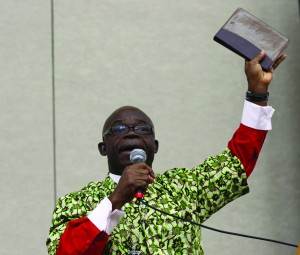
The Rev. Jerry Kulah preaches during the African central conference worship service during General Conference. Photo by Kathleen Barry, UMNS.
A Message from the UMC Africa Initiative
We have been following the events and activities of the five jurisdictions of The United Methodist Church with mixed emotions and serious concerns about the future of our beloved church. We have read of actions taken by some in gross disobedience to the Bible and our Book of Discipline, and of others who have written to express their disagreements. We are deeply concerned. However, we are praying for God’s intervention as we discern God’s plans for the future of our church.
It is shockingly amazing that in the letter sent to the Council of Bishops from the organization called “Love Prevails” prior to the 2016 General Conference there was no mention of a specific reference to any passage of the Holy Scripture, our primary authority for doctrine, faith, and Christian living as the Church of Jesus Christ, to support any of its claims, arguments, and demands and justifications for the actions it has taken in recent times. This attitude and behavior has the propensity to embarrass, ridicule, and blur the message of the liberating Gospel of Jesus Christ, which alone has the power to save and transform society.
In light of the commitment we (African delegates to the 2016 General Conference) made to the request of the Council of Bishops by our support to have them set up a special Commission to inquire into all human sexuality issues contained in our Book of Discipline, many of us are deeply saddened by the actions of some of our brothers and sisters to attempt to derail the unity of global Methodism. Their actions to grossly disrespect our bishops and disobey our global decision at the 2016 General Conference are incompatible with fostering unity within global Methodism.
Furthermore, their actions seem to confirm the fears of our founding father, John Wesley. About five years before his demise, Wesley had expressed his fears about the future of our church in regards to its continued commitment and submission to the Scripture and discipline that govern us. He said, “I am not afraid that the people called Methodist should ever cease to exist either in Europe or America [in Africa and the rest of the world]. But I am afraid, lest they should only exist as a dead sect, having the form of religion without the power. And this undoubtedly will be the case, unless they hold fast both to the doctrine, spirit and discipline with which they first set out.”
When we abandon the clear teaching of Scripture in favor of some philosophies and ideologies of contemporary society, we cease to exist within God’s parameter of grace.
We are left to wonder, why are we not identified as Muslims, Buddhist, Hindus, etc., but Christians? It is because every religious faith has a doctrine and a religious code of conduct that distinguishes it from all other religions. In the case of Christianity, it is the Bible, the Holy Word of God, as the Quran is for the Muslims. One’s religious identity is not found in the most appealing cultural or political system of the day, for that is fleeting. Loyalty, obedience, and submission to the teachings of these “divine writings” of the faith to which one belongs defines, distinguishes, and truly identifies adherents. One cannot claim to truly be a member of any of the world’s religions and live in gross disobedience to its teachings (John14:15; Psalm 119:9-11,105; 19:7-11).
Let the church be the church; and let not the culture of the day define the global Christian community called United Methodist, but the Bible (Joshua 1:8; 2 Timothy 3:16-17).
The Christian Church, bought and birthed with the blood of Jesus Christ (Isaiah 53:1-13; Matthew 27: 32-61; John 10:10-11; Hebrews 10:1-39) is not and cannot be a social club; it cannot be directed by any form of political activism that contradicts the teachings of Scripture. And it is not a social or political system based on humanism or secular ideologies and philosophies (2 John 2;15-16; Colossians 2: 8-15;1 Samuel 8) that seeks endorsement for a kind of “human rights” to the detriment of human existence as God our Creator has designed it. Instead, the Church of Jesus Christ is a global community redeemed by the blood of Jesus Christ, who lives in loving relationship with their Lord and Savior, Jesus Christ. They are a people called out from the world and yet sent into the world (John 16:7-11; Acts 1:8; Genesis 6:5-9; Deuteronomy 6:4-9; 28; Judges 2:10-13; 17:6) to share the Gospel in the power of the Holy Spirit in order that persons might come to faith in Christ and become disciples of Jesus Christ for the transformation of the world. We cannot in any way be “bad news” by our decisions, actions, and attitudes, and yet attempt to proclaim the good news.
It is time to return to the faith of our fathers and mothers (the Holy Scriptures) and be the church. In spite all that is going on, there is hope for the continued growth and development of the Church of Jesus Christ because Jesus is still the Lord of His Church. We will remain committed and determined to live in loyalty and obedience to the teachings of the Holy Scriptures, and to our Book of Discipline.
We will also remain supportive of the unity of the global United Methodist Community as long as the Bible remains our primary authority for faith and Christian living. We shall remain loving of members of the UM Church who have chosen to tread the cultural path of contemporary society that is inimical to the teaching of Scripture, in the hope that we will reconcile our differences and submit to the Lordship of Christ. They are our brothers and sisters for whom Christ also gave his life. However, we shall not compromise our Christian faith on the altar of what seems to the minds of some to be “socially acceptable and politically correct” cultures and practices of contemporary society.
We are confident that God is in sovereign control of His Church. He promises to continually build it until He returns to receive us unto Himself, and the gates of hell shall not prevail against it (Matthew 16:18b). We need to only be still, yet vigorously prayerful and discerning in such a time as this, and we will see the deliverance of the Lord.
We must admit that the global United Methodist Church is at the crossroads (Jeremiah 6:16). We have choices to make. On one hand, we can choose to obey God and His word, and thereby repent of the sin of gross disobedience and abandon the quest to be like the rest of the world. On the other hand, we can choose to continue in pursuit of what the cultural practices of the day dictate that denies God’s sovereignty over God’s creation and accepts what feels good, what seems politically acceptable to society, etc. The choice is ours.
But as Joshua, at the close of his ministry in Shechem, said to all of the Israelites, and by implication to all United Methodist at the crossroads today, we wish to challenge all born-again believers in Jesus Christ (John 3:3-5), in the words of this great general of God’s people, “Now fear the Lord and serve him with all faithfulness…But if serving the Lord seems undesirable to you, then choose for yourselves this day whom you will serve…But as for me and my household – the UM Community in Africa, in particular, and all faithful Christians everywhere who are committed to the Lordship of Jesus Christ and the undiluted Word of God for belief and practice – we will serve the LORD” (Joshua 24:14-15).
Together, we shall make it for God’s glory (Joshua 2:17-18; 2 Samuel 10:9-12). God has wonderful plans for the prosperity of His Church on earth (Jeremiah 29:11). Let us be firm and very courageous in prayer and in discerning God’s will for the future of our church, always abounding in the Word of the Lord; for we know our labor in the Lord is not in vain (Joshua 1:4-6; 1 Corinthians 15:58). May God bless the people called United Methodist.
The UMC Africa Initiative is a coalition of United Methodist leaders in Africa who were elected to the 2016 General Conference. This message was written by Rev. Dr. Jerry P. Kulah on behalf of the UMC Africa Initiative. Kulah is the West Africa Central Conference Coordinator of the UMC Africa Initiative and the dean of the Gbarnga School of Theology, a United Methodist seminary in Liberia.

by Steve | Aug 31, 2016 | July-Aug2016, Magazine, Magazine Articles
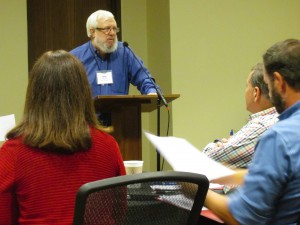
Dr. William J. Abraham, professor at Perkins School of Theology in Dallas, addresses the Wesleyan Covenant Association gathering.
WCA Press Release
The newly launched Wesleyan Covenant Association (WCA) is a membership-driven initiative to link congregations, clergy persons, and laity to “promote the ministry of the gospel from a Wesleyan theological perspective within The United Methodist Church and kindred bodies,” according to bylaws adopted by nearly 50 United Methodist leaders gathering in Houston on August 1 and 2.
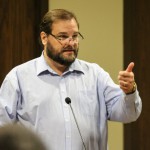
Dr. Chris Ritter
“We are a movement of like-minded, warm-hearted, Jesus loving, Wesleyan, evangelical, orthodox, and covenant-keeping Christians who are connected together in mission,” said the Rev. Dr. Jeff Greenway, lead pastor of Reynoldsburg (Ohio) United Methodist Church.
The group gathered to adopt bylaws and nominate a first slate of Council members that will be elected at their initial public gathering on October 7 in Chicago at the Donald E. Stephens Convention Center. Information on the Chicago event can be found online at WesleyanCovenant.org.
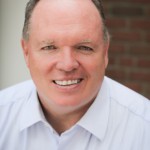
Rev. Jeff Greenway
“Our meeting was both serious and hopeful,” said Dr. David Watson, academic dean at United Theological Seminary in Dayton, Ohio. “We prayed together, broke bread, shared ideas, agreed and disagreed, and learned from each other. We affirmed together that we are not another caucus group, but a community established for mutual encouragement, resourcing, and accountability. We simply want to embody Wesleyan holiness in a way that is already articulated in United Methodism’s Doctrinal Standards, but is often set aside in actual practice.”
In addition to Watson, other prominent United Methodist theologians in the group included Dr. Billy Abraham of Perkins School of Theology in Dallas and Dr. Bill Arnold of Asbury Theological Seminary in Wilmore, Kentucky. There were clergy and laity representatives from all five jurisdictions in the denomination, including from embattled annual conferences such as Rocky Mountain, New York, and Iowa.
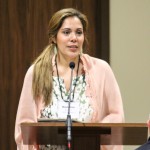
The Rev. Madeline Carrasco Henners
“As a young orthodox United Methodist, I am excited about the creation of the Wesleyan Covenant Association as a coalition committed to the authority of God’s Holy Word, our Wesleyan heritage, and Holy Spirit empowered revival,” said the Rev. Madeline Carrasco Henners, pastor of Luling (Texas) First United Methodist Church. “We know that many pastors in many progressive annual conferences feel isolated from their fellow orthodox brothers and sisters. This alliance will help them have their voices heard in matters affecting the unity of the global church.”
Morning devotional messages were brought by the Revs. Ryan Barnett, Kerrville (Texas) United Methodist Church, and Carolyn Moore, senior pastor of Mosaic United Methodist Church in Evans, Georgia. The concluding service of holy communion was conducted by Henners and the Rev. Jessica LaGrone, dean of the chapel at Asbury Theological Seminary.
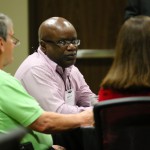
The Rev. Kenneth Levingston (center)
The group established that one of its main purposes was to “promote the worship of the Holy Trinity, to preach the pure Word of God, to uphold the rich tradition of sacramental practice, to maintain Christian fellowship, to foster the edification of believers, and to welcome and advance the work of the Kingdom of God on earth.”
“During this time of so much uncertainty in United Methodism, the Wesleyan Covenant Association is bringing a fresh voice of hope, strength, and encouragement to those seeking traditional Biblical values,” said Jennifer Cowart, executive pastor at Harvest Church in Warner Robbins, Georgia.
“The United Methodist Church has a rich heritage of reaching people for Christ and helping them grow into mature disciples. However, we now find ourselves at a crossroads of what the future holds for our tribe. The WCA provides a network of like minded laity and clergy who cherish biblical traditional values.”
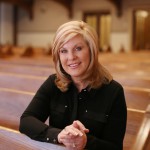
Jennifer Cowart
An erroneous report on the online version of Charisma magazine claimed that the WCA was ready to create a new denomination. Charisma issued a second story to correct their faulty reporting. Furthermore, Bishop Bruce Ough, president of the United Methodist Council of Bishops, inappropriately blamed the formation of the Wesleyan Covenant Association as having “opened deep wounds and fissures within The United Methodist Church and fanned fears of schism.” (See page 24.)
Leaders at the event agreed that both cases of severe mischaracterization should be retracted and corrected.
“Some have jumped to the conclusion that the formation of the Wesleyan Covenant Association is an effort to force schism and start a new denomination,” said Greenway. “I can understand why some might say that because these are confusing times and many forces are at play in the United Methodist family trying to shape what is to come. I can say unequivocally that we are not creating or starting an effort to leave our denomination, but we are developing an association of churches and leaders who are committed to live and practice what we say we believe.”
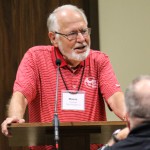
Dr. Maxie Dunnam
Those in attendance at the meeting want to be active in responding to the upcoming Council of Bishops’ commission that will bring proposals to shape the future of The United Methodist Church.
“We do not know what that will be, but we do believe that change is coming,” said Greenway. “As we live into what comes next, the WCA is committed to preserving the core of what we believe and practice as United Methodists. We are not leading a separation, but we are committed to being faithful to our convictions.”
The commitment to faithfulness in uncertain times was a shared sentiment at the gathering. “Christianity was born in a hostile culture. We were born in the Roman empire, that tried to destroy Christianity. And so it’s not the culture that’s going to determine who we are, it’s our faith,” said the Rev. Kenneth Levingston, senior pastor of Jones Memorial United Methodist Church in Houston. “It’s whether or not we’re willing to stand up in the culture and love it and still call it to live in a faithful way and manner with Jesus Christ.”
Wesleyan Covenant Association press release. The WCA offers email updates at www.wesleyancovenant.org/contact-us.

by Steve | Aug 31, 2016 | July-Aug2016, Magazine, Magazine Articles
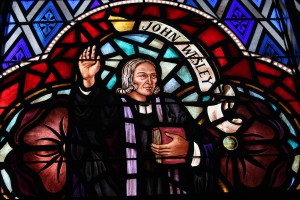
Stained glass window depicts Methodism’s founding father, John Wesley. Photo by Ronny Perry, United Methodist Communications.
As clergy and lay leaders of healthy, vibrant, and orthodox United Methodist congregations, and as teachers preparing the future clergy leaders of our denomination, we welcome the creation of the Wesleyan Covenant Association. In these times of great uncertainty about the future of The United Methodist Church, we believe it is important for orthodox congregations, clergy, and laity to work together, to support one another, and to encourage each other. We long for a church committed to sharing the Gospel of Jesus Christ with the last, the least, and the lost.
Committed to the Wesleyan expression of orthodox Christianity, we believe the church can and must do better. We are alarmed by the growing loss in average worship attendance in many of our annual conferences. We regret the now numerous instances where colleagues in ministry have broken covenant with the rest of the church and sowed the seeds of schism. We are grieved by the actions of annual conferences that have decided not to conform to our Discipline. And we are disappointed in leaders who have failed to maintain the good order of the church. Consequently, the work of faithful pastors and laity has been undermined, healthy congregations have left the denomination, and thousands of United Methodists have gone in search of other places to worship and serve.
We believe the Wesleyan Covenant Association will give orthodox United Methodists hope for the future and serve as a source of encouragement as the church works through a critical period of discernment. We want to serve in close partnership with our brothers and sisters in Africa, Europe and the Philippines. And we want to be prepared to act as one in light of the important work and recommendations of the Bishops’ Commission on the Future of the Church. We encourage all orthodox clergy and laity to remain steadfast and faithful in these uncertain times. We believe the Wesleyan Covenant Association will bind us together and make us a strong, united witness for Scriptural Christianity.
We believe that God is “doing a new thing.” We believe a new and better day is coming for the people called Methodist who are committed to the Lordship of Jesus Christ, the authority of the Scriptures, and the church’s being a missional force determined to reach a lost culture. We yearn to step into this new future together with others of like minds and hearts.
Please visit the Wesleyan Covenant Association website (www.wesleyancovenant.org) to learn more about it. We also hope you will plan to join us in Chicago on October 7, 2016, for the first gathering of the association.
We are confident you will be hearing more about the association in the weeks and months ahead, and we trust you will join us as we band together for the sake of a vibrant, Wesleyan expression of orthodox Christianity.
In Christ,
Billy Abraham, Perkins School of Theology, Dallas, Texas
Bill Arnold, Asbury Theological Seminary, Wilmore, Kentucky
Ryan Barnett, Kerrville First UMC, Kerrville, Texas
Keith Boyette, Wilderness Community UMC, Spotsylvania, Virginia
Larry Bryars, Frazer UMC, Montgomery, Alabama
Madeline Carrasco Henners, Luling First UMC, Luling, Texas
Kenneth J. Collins, Asbury Theological Seminary, Wilmore, Kentucky
Ferrell Coppedge (lay), Mt. Bethel UMC, Marietta, Georgia
Bryan Collier, The Orchard UMC, Tupelo, Mississippi
Jennifer Cowart (lay), Harvest UMC, Byron, Georgia
Jim Cowart, Harvest UMC, Byron, Georgia
Dan Dalton (lay), Dalton & Tomich, Detroit, Michigan
Joe DiPaolo, First UMC, Lancaster, Pennsylvania
Maxie Dunnam, Christ UMC, Memphis, Tennessee
Walter Fenton, Good News, The Woodlands, Texas
Scott Field, Crystal Lake UMC, Crystal Lake, Illinois
John Gaulke, Altoona UMC, Altoona, Iowa
John Gerlach, Trinity UMC, Windsor, Connecticut
Tommy Gray, Asbury UMC, Madison, Alabama
Jeff Greenway, Reynoldsburg UMC, Reynoldsburg, Ohio
Joy Griffin (lay), International Leadership Institute,
Carollton, Georgia
Wes Griffin, International Leadership Institute,
Carollton, Georgia
Daniel Hannon, Christ UMC, The Woodlands, Texas
Jeff Harper, Evangelical UMC, Greenville, Ohio
Tom Harrison, Asbury UMC, Tulsa, Oklahoma
Jeff Jernigan (lay), Powder Springs, Georgia
Randy Jessen, Parker UMC, Parker, Colorado
Rick Just, Asbury UMC, Wichita, Kansas
Charles Kyker, Christ UMC, Hickory, North Carolina
Jessica LaGrone, Asbury Theological Seminary, Wilmore,
Kentucky
Thomas Lambrecht, Good News, The Woodlands, Texas
Jim Leggett, Grace Fellowship UMC, Katy, Texas
Kenneth Levingston, Jones Memorial UMC, Houston, Texas
Greg McGarvey (retired elder), Indiana Annual
Conference, Fishers, Indiana
Andrew B. Miller (lay), Franklin, Tennessee
Pat Miller, (lay) The Confessing Movement, Indianapolis,
Indiana
Carolyn Moore, Mosaic UMC, Evans, Georgia
Mike Morgan, Marion First UMC, Marion, Iowa
Norman Neel (lay), San Augustine, Texas
Martin Nicholas, Sugarland UMC, Sugarland, Texas
Craig Peters, Shueyville UMC, Shueyville, Iowa
Jody Ray, Mt. Bethel UMC, Marietta, Georgia
Rob Renfroe, The Woodlands UMC, The Woodlands, Texas
Chris Ritter, Geneseo First UMC, Geneseo, Illinois
Ed Robb III, The Woodlands UMC, The Woodlands, Texas
Chuck Savage, Sardis UMC, Atlanta, Georgia
Branson Sheets, Covenant UMC, Winterville, North Carolina
Stephen Sparks, Indianola UMC, Indianola, Mississippi
Shane Stanford, Christ UMC, Memphis, Tennessee
Greg Stover (retired elder), West Ohio Annual Conference,
Lake Waynoka, Ohio
Andrew Thompson, Springdale First UMC, Springdale,
Arkansas
Richard Thompson, First UMC, Bakersfield, California
David Watson, United Theological Seminary, Dayton, Ohio
Ken Werlein, Faithbridge UMC, Spring, Texas
Max Wilkins, The Mission Society, Norcross, Georgia
* Church names provided only for identificational purposes.












